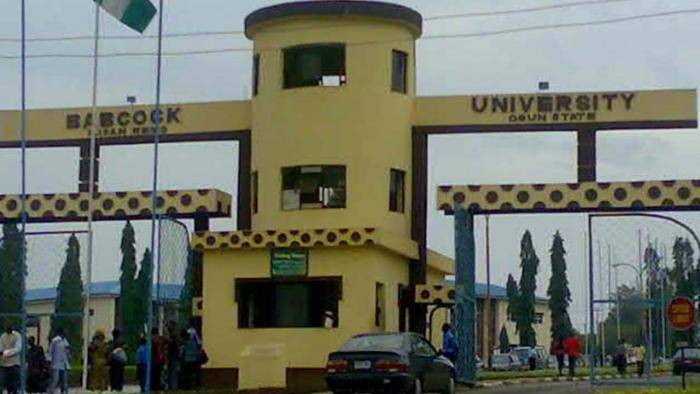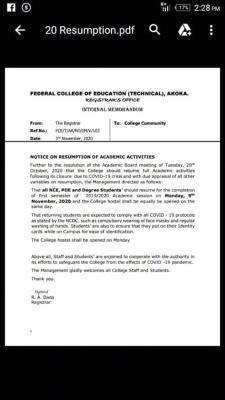
Interview
Former Chairman of Odu'a Investment Group, Engr. David Oni who is the Founder and Executive Chairman of Dave Abion Consulting, in this interview with journalists, sheds light on some topical educational issues including why many Nigerian students excel abroad.
What inspired you into the education consultancy business?
I was educated in the UK where I studied Mechanical Engineering at the University of Greenwich, London with a scholarship from British Petroleum Co. Ltd. When I got there and saw the method of teaching and learning and the facilities that were available in terms of books, library materials, laboratories, workshops, etcetera, it dawned on me that the UK is the perfect study destination. I worked for many years in British Petroleum and other companies when I came back. On my retirement, I decided to set up my own consultancy so that many Nigerians can enjoy what I enjoyed when I studied in the UK.
There have been numerous instances whereby Nigerians who had their secondary education or first degree programme here, emerge the best students once they go abroad for studies. What do we attribute such development to?
What I would say is that most Nigerian students excel when they travel abroad more than they would have excelled here. This situation can be explained through the statement of an American management consultant. "Success is equal to opportunity plus capability." Many Nigerians have the capability but they do not have the opportunity when they are here in Nigeria. So when you add their capability to the opportunities that open to them when they are in the UK, I am not surprised that they excel. World-class libraries, good lecturers, good facilities and excellent environment. I won't compare them to UK students but most of them do excel beyond the expectation of many people.
How do we explain the current craze for overseas education in which Nigerian students now move out in droves even to countries like Togo and Benin Republic both of which are not better than Nigerian in terms of educational infrastructure?
We are selective in terms of the countries we send Nigerian students to and specialize mostly on UK institutions. Nigerians tend to love everything foreign. Whenever some students talk to me, I always ask them whether they want to go abroad for the hope of heaven or for the fear of hell; hope of heaven because there are better libraries and better laboratories, etcetera or the fear of hell because there is no electricity here and you are tired of armed robbers and bad roads. I always appreciate a situation where students want to go abroad for the hope of heaven.
Once you get your qualifications from a top British University, you are from a world class university and you get a good job anywhere. If you have an MSc or Phd from say Glasgow University, you are simply irresistible in terms of employment; there is nowhere in the world you cannot get a job. Some Nigerian universities are very good and well known abroad, others are not. So I think the craze for foreign education arises from the fact that people know that if you struggle and make a good grade from a British University, you are more or less made for life!
A lot of Nigerians go to Ghana for their education. The qualification of Ghanaian universities is very good, their educational system is stable and they hardly go on strike unlike here in Nigeria where you can go in for a four-year programme and may not finish in seven years.
Education is not only about reading, writing and arithmetic, you also want to make friends. Later on in life when you graduate, you discover that you have developed life-time opportunities through your network of friends. Many Nigerians may not be aware of the value of such networks because they believe that they are only there to read their books and nothing more. We always counsel them before they leave that they are not going to read only physics and chemistry, they are also going to read the chemistry of life and make friends that will be useful to them for the rest of their lives.
What is the possibility of Nigerian universities fulfilling those needs that make our students go to UK universities?
There is nothing impossible. I met Prof. Peter Okebukola at Lancaster University in 2005 and that was the same question he asked me. "Engr. Oni, you are taking Nigerian students to Britain to study, why are you not bringing British students to Nigeria for studies?" This is a possibility. The world has become a global village, not only in the field of education but in the field of technology, culture and almost every sphere of life. People can come here and study our culture, language, etcetera and we should also be able to travel out and study. At the moment, the trend is one way: people want to travel to China, US, Germany and UK.
It's one-way and may remain so until we are able to improve our infrastructure, security, health services, power and safety consciousness. If these facilities improve, there is no way the flow which is uni-directional at the moment cannot become bi-directional, so that people come here and we go there. That's the way it is supposed to be in a globalised world. People are not coming to Nigeria for reasons we all know. Nobody will hear of Boko Haram and decide to risk his life coming here.
Educational consultancy for foreign students seems to have become an all-comers' affair. Are there factors that make Dave Abion consulting to stand out from the crowd?
In every sphere of human endeavour, there are always cowboys: cowboy doctors, lawyers, bankers and teachers. We stand out for a number of reasons. First, our organisation is recognised by the British High Commission and the British Council. We are also affiliated to the ICEF, an international body that recognises quality and brings quality education consultants in contact with quality education providers. I attended the ICEF seminar for a week in Dubai last January. People know us in the industry and we also know our students and their parents very well. We operate nationwide and are fully registered with the authorities. We have offices in Ikeja, Victoria Island, Abuja and Port Harcourt.
How do you keep tab on your students after their graduation to know how they are faring?
We encourage the students to keep in touch with us through emails, letters, telephone, text messages etcetera. When you are still studying, we ensure that there is regular communication between us and we keep that up after your graduation. That's how we are able to learn that four or five of our students came out with First Class degrees in their undergraduate studies last year. When they finish, many of them prefer to stay abroad for a while at least to get quality job experience.
Assuming you studied engineering, by the time you come back, you must have got a job over there with a quality engineering firm here in Nigeria. We are interested in all our students. Apart from piloting them towards a quality education that will make them stand out anywhere, we are interested in how they progress in their careers overseas and on their return to Nigeria.
What do you consider as the basic problem of Nigeria's educational system?
The problems are numerous. But essentially it is the problem of leadership of the country. There is no articulated philosophy of education. It might have been stated in the constitution but that's not enough. I know that the United Nations Organisation stipulates that any country that is serious about education must devote at least 26 per cent of their annual budget to education. I am sure that what Nigeria devoted to education this year is not more that 8 per cent! In the last 10 years, the story has not been different.
One of the key problems therefore is under-funding. There is a lot of demand when about two million people will take the University Matriculation Examination (UME) each year and only about 250,000 will be absorbed by all the universities and polytechnics in the country. Over a million students waste away every year from UME and a fresh set comes up the next year. The existing universities cannot even be properly funded and people are thirsty for education because they know the value and understand that education makes them able to contribute meaningfully and effectively to national development.
If you go to Britain, they try to adjust their educational system to the political and economic realities of their country. Manpower planning is essential. For example, you are looking for a plumber or electrician, if there is good manpower planning, where are the institutions where you train plumbers and electricians here in Nigeria? UK, USA, Canada, Germany and Australia have institutions that train and certify this category of people.
In Nigeria, everybody must go to the university and you have lots of university graduates who are not employable. We are putting unnecessary emphasis on university degrees. A good plumber could earn more than a university professor in the UK. The plumber is trained in the technical college and is happy to be a plumber. Here everybody is running after university degrees. Government has to fundamentally develop a policy on education and be determined to provide the proper level of funding needed to execute the policy. The private sector should also be encouraged to play a key role.
A school of thought believes that the country's standard of education is falling, while another school believes it is rising. Which of the two do you belong to?
I belong to the one that says the standard is falling. If I am facing somebody in a debate on this issue, first of all, we must agree on what is meant by standard. People debate on a lot of things in Nigeria without agreeing on the fundamentals. Somebody will say that the educational standard is going up and point to the fact that students now easily go online and go on Apple Ipad and things like that.
But I will be arguing that many years ago, if somebody was in form five, he would've studied History, Geography, Mathematics and have a very good all-round education. Today, the reverse is the case. There was a time I asked my secretary who holds a Higher National Diploma to send a message to Jos. She sent it overseas and told me that Jos was in England!
What we do in my office requires a fair knowledge of Geography so I brought somebody who was a graduate of Geography from one of our local universities. I gave him a map of England and asked him to show me where Manchester was on the map. He couldn't. The vocabulary of most of today's graduates is so shallow and their knowledge of the English language is so poor that they cannot communicate well. I could write better English in form 2.
The kind of things they used to emphasize to us: "write well, think clearly, put it down", have all gone. Because of the work I do, I have substantial evidence to prove that the standard of education in the country has gone bananas. If Nigeria is serious about moving forward, we must start improving our standard of education from the primary school level right through to secondary, technical/polytechnic to university.



